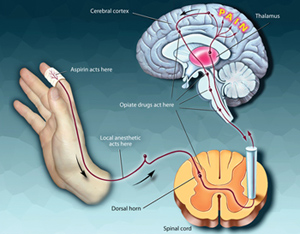Recent advances in next-generation sequencing technologies are revolutionizing the way human disease is defined, providing avenues to develop novel, individualized therapies that target the genomic underpinnings of a patient’s condition. No disease has been more directly impacted by this than cancer, which is fundamentally a disorder of acquired somatic alterations. This webinar focuses on OncoPanelTM, a collection of 240 genomically and histologically diverse cancer cell lines, that provides multiplexed high-content imaging analysis of therapeutics in oncology.
Integration OncoPanelTM High-Content Cell Line Profiling and Univariate Genomics Analysis to Discover and Prioritize Predictive Biomarkers in Oncology
By leveraging advancements in sequencing, it is now possible to define the genomic landscape of cancer subtypes, including mutations in coding and non-coding regions of DNA, gene fusions, intra- and inter-chromosomal rearrangements, changes in DNA copy number, DNA methylation patterns, and expression of individual mRNAs and miRNAs. However, understanding which subsets of genetic lesions predispose a cancer cell to drug sensitivity or resistance remains a complicated challenge. We have developed an application that compares drug response data (IC50, EC50, GI50, GI100, or 5-fold induction of apoptosis) acquired on the OncoPanel high-content imaging platform to internal and public genomics data to: (1) identify significant genomic features associated with sensitivity or resistance to the tested therapeutic, and (2) prioritize them based on statistical metrics including p-value, q-value, sample size, and effect size. The most significant biomarkers are further analyzed in the context of cancer subtype definitions to reveal those subtypes where the predictive power of the genomic biomarker is greatest. Several examples will be discussed in this webinar to illustrate the predictive power of this approach to identify biomarkers of response.
High-Content Cell Line Profiling and Univariate Genomics Analysis to Discover and Prioritize Predictive Biomarkers in Oncology
High-content imaging is ideally suited to detect binding, localization, and trafficking of therapeutic antibodies, adding an important level of resolution when interpreting drug response data. Moreover, understanding relative antigen expression is important both to define the patient population most likely to benefit from therapy and to relate antigen expression to biologic response. Here we describe the high-throughput parallelization of quantitative, comparative therapeutic antibody binding measurements and drug response profiling data by OncoPanelTM high-content imaging. High-quality binding data for monoclonal antibodies is achieved by analysis of referenced, background-subtracted fluorescence intensities on both a per cell and per cell area basis. Binding studies are performed on living cells to best recapitulate natural antigen-antibody interactions, and results are expressed as potency (EC50 values), total cell-surface antigen, and cell-surface antigen density. Binding intensities are internally referenced against calibrated fluorescent antibody-conjugated microspheres to yield a quantitative metric of the number of antibodies bound. The therapeutic antibodies panitumumab, cetuximab, and trastuzumab were profiled against OncoPanel, providing a rank-ordering of cell surface expression of EGFR and ErbB2/Her2 across 240 cancer cell lines and were related to effects on cell proliferation. Genomic analysis of antibody response revealed genomic features associated with sensitivity or resistance to these therapeutic antibodies. By combining antibody binding and genomics analysis generated through the OncoPanel platform, one can define the most relevant molecular features associated with the activity of any monoclonal antibody.
Speakers

O. Jameel Shah, Ph.D, Principal Scientist and Group Leader, Oncology, Eurofins Panlabs
Jameel is a Principal Scientist and Group Leader in the oncology department at Eurofins Panlabs where he is responsible for logistics, oversight, and development of OncoPanelTM, a high-content, multiparametric cancer cell line profiling service to discover and prioritize predictive biomarkers for the treatment of cancer. He designed, validated, and implemented proprietary genomics analysis application to identify and prioritize predictive genomic biomarkers using OncoPanel cell profiling data using small-molecules or biologics and internal and public genomics data. Before joining Eurofins Panlabs in 2012, Jameel worked for over seven years at Abbott Laboratories in the oncology division. He is an experienced drug discovery scientist in the Pharmaceutical industry and has expertise in the area of cell biology and oncology with a proven track record of success and innovation. Involved in the advancement of three small-molecule programs into clinical trials, he has held a variety of leadership positions overseeing preclinical discovery teams where he conceptualized, validated, and implemented a novel chemogenomics approach that aligns the discovery of oncology targets, lead-like molecules, and predictive biomarkers to identify genomically-targeted therapeutics for treatment of cancer. This approach has already yielded an oncology program scheduled for IND submission.
Jameel has a Ph.D. in Cellular and Molecular Physiology from the Pennsylvania State College, College of Medicine. He was a postdoctoral fellow at the Salk Institute for Biological Studies in the field of cell growth control and signal transduction. He has received numerous awards and has authored 15 published peer-reviewed research articles. He has two pending patents.

Jonathan Crane, Ph.D., Senior Scientist, Oncology and Cell Biology, Eurofins Panlabs
Jonathan is a Senior Scientist of Oncology and Cell Biology at Eurofins Panlabs, responsible for new assay development with a focus on emerging biologics as novel cancer treatments. Before joining Eurofins Panlabs in 2012, Jonathan worked in the Department of Antibody Engineering at Genentech, Inc. There he was responsible for the discovery and improvement of monoclonal antibodies for clinical targets through phage display, quantitative binding analysis and molecular engineering. He performed his postdoctoral fellowship at the University of California San Francisco, where he developed novel imaging methods to define the role of pathogenic autoantibodies in the onset and progression of neuroinflammation. Jonathan has a Ph.D. in Biophysics from the University of Virginia, and a B.S. in Chemistry from the University of Oregon. He has authored 17 published peer-reviewed research articles and 5 invited review articles.
Who Should Attend?
Senior Vice Presidents of Research & Development, Vice Presidents of Translation Medicine, Directors and Scientists in Oncology
Xtalks Partner
Eurofins Panlabs
Eurofins Panlabs is a global CRO specializing in discovery pharmacology testing services. We’ve been in continuous operation for over 40 years serving the Pharmaceutical and biotechnology community, setting the benchmarks for quality, convenience, and scientific expertise.
Our mission is to provide pharmacological testing services that predict clinical effects. Eurofins Panlabs scientific portfolio consists of over 1350 tests ranging from molecular assays, to cell-based models, through proof of concept in vivo activity determinations.
We are an extension of our client’s capabilities, providing unrivaled pharmacological expertise and knowledge, superior data reliability, and innovative solutions for drug discovery.
Media Partner
You Must Login To Register for this Free Webinar
Already have an account? LOGIN HERE. If you don’t have an account you need to create a free account.
Create Account

